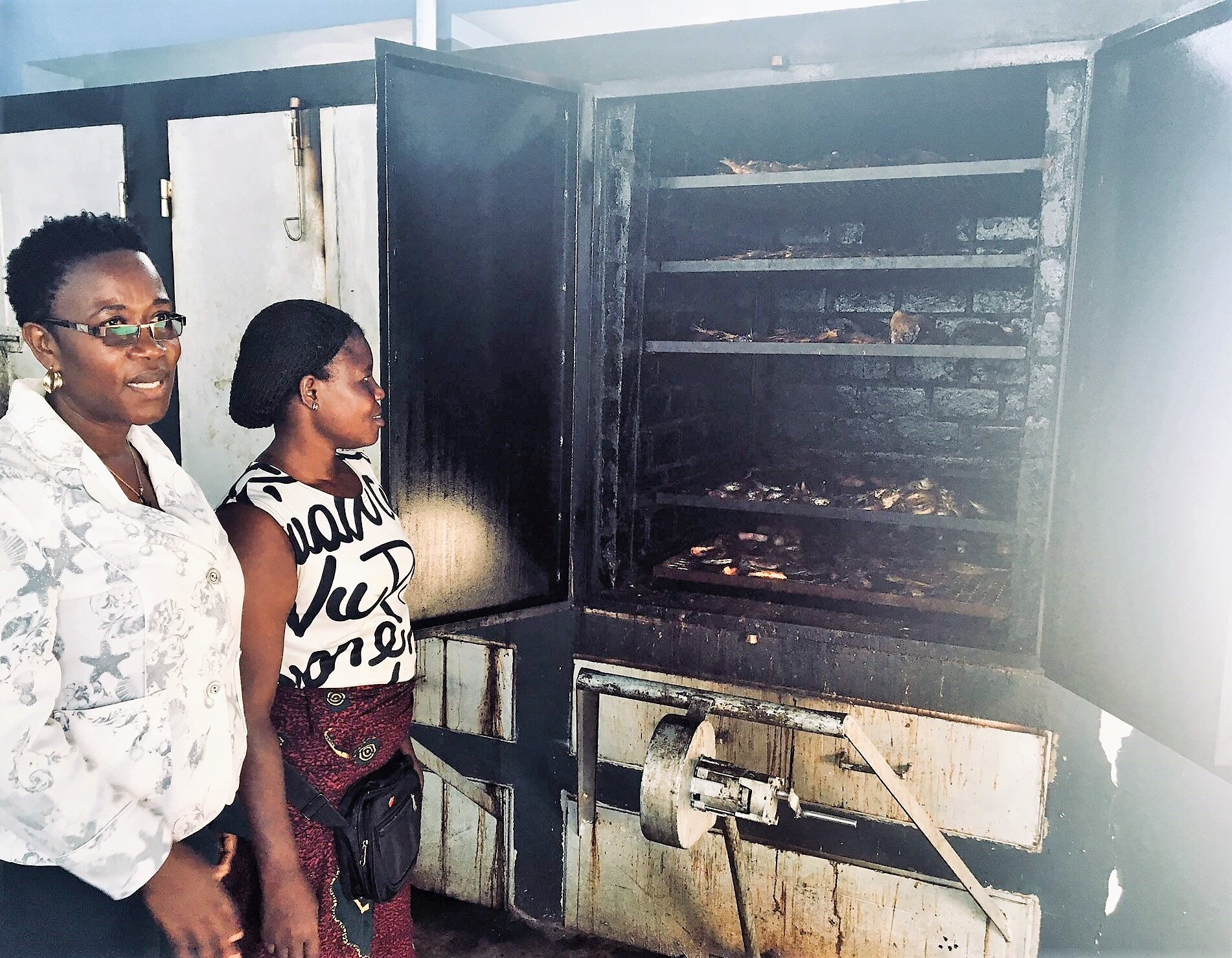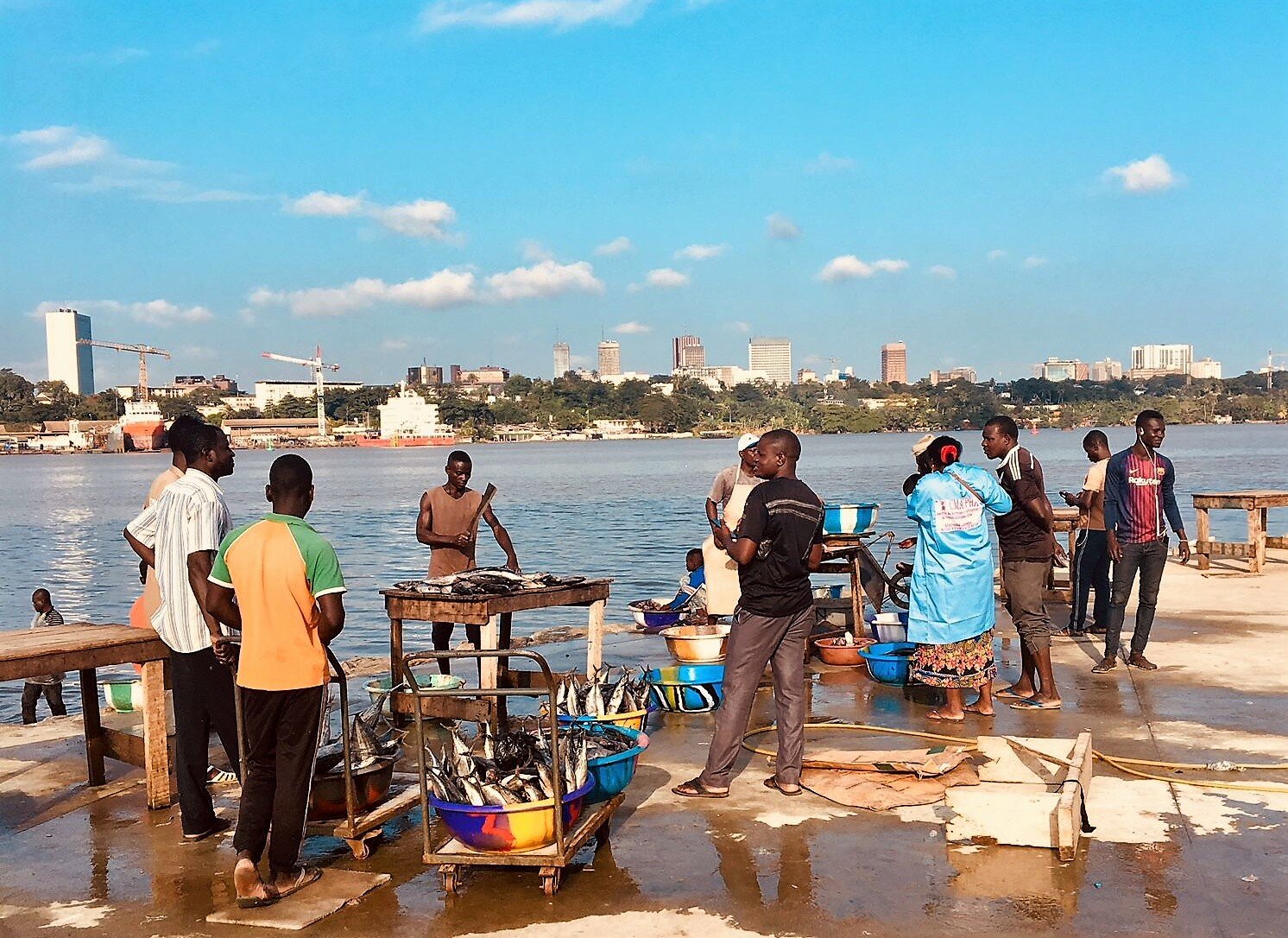Alexandre Rodriguez, Executive Secretary of the EU Long Distance Fishing Fleets Advisory Council (LDAC) shares with us his personal reflexions after a visit to the wompen fish processors in Abidjan.
Abidjan, 28 August 2018
This week, I had the occasion to travel to Cote d´Ivoire invited by one of our partner organisations in Africa, the Ministerial Conference on Fisheries Cooperation among African States Bordering the Atlantic Ocean (ATLAFCO-COMHAFAT). It was a fruitful and intensive 2.5 days where we were able to agree on the plan of action for African Atlantic States for sustainable fisheries in 2019 and 2020.
I spoke to Mr. Gaoussou Gueye, the President of the African Confederation on Artisanal Fisheries (CAOPA) who was also attending the proceedings, on the possibility of meeting our common friend Micheline Dion, responsible of CAOPA Women's Programme, at her workplace to see some “real action in the field”.
I could not be any luckier as the president of CAOPA, apart from being an excellent human being with a big heart, is as well respected professional and widely known for his work amongst West African fishing communities. So it was not very difficult for him to contact Micheline and arrange a short visit to the port to see the work of the women´s fish processors cooperative she is running.
We took a local taxi and arrived at Locodjro Miami, a quiet suburb 12km off Plateau. We arrived at a little dock surrounded by a beautiful scenery with the tall skyscrapers and the foreign industrial tuna purse seiners moored in the Port of Abidjan, on the other side of the bay.
As soon as we stepped out of the taxi, we were received with a big smile and a warm welcome by Micheline and her fellow women who gave us the classical “bonne arrivée” greeting. I start suddenly feeling this subtle sensation of heartwarming hospitality which is embedded in the Akwaaba spirit, a word that comes from Twi, a language of the Ashanti people of the neighboring nation Ghana, and carries the same meaning in the Ivorian dialect.
Micheline was one of the founders and main architects behind the creation of the Women's Processors Cooperative in Locodjro with the aim to improve revenues and working conditions for the local community living from the processing of fish, particularly tropical tuna but also other species such as langoustine.
Gaoussou and Micheline seemed to know every single person and they both talked cheerfully to any worker with whom we crossed paths, listening carefully to each of their concerns and hopes. Through cleverly posed questions , they adeptly managed to introduce me into the dialogue so I felt part of the community and also could start asking my own questions regarding daily conditions at work.
The activity was quite small when we arrived as most of the pirogues that catch the tunas were out at sea. They all leave early in the morning and come back at sunset. I could see la pirogue du chef, who was moored on that day. I asked how much fish they usually got from the pirogues, and they say that it varies from day to day but ranges from 200 kg up to 1 tonne per day.
Micheline explained that the work is very much dependent on the supply of raw tuna. Overall, she estimated that they work in total about 2-3 months a year overall. In terms of employment, the Cooperative currently employs 902 pêcheurs (fishers), 305 transformatrices (women processors), 173 découpeurs/ses (fish cutters) and 283 chargeurs (loaders), mostly locals from the Abidjan area. In the words of Micheline, “chaque élément de la chaîne de valeur est important et joue un rôle clé du fonctionnement”. This includes also some volunteers which have offered their help for different tasks such as cleaning the premises or doing the basic accounting.
I had been really impressed so far by what I was seeing together with the clarity of thought and explanations from Micheline on how the Cooperative should work. This is why I asked her to draw me a sketch on the value chain so I could understand well the whole economic cycle. She patiently explained me that their work can be summarised in 5 basic steps:
Débarquement: The fresh daily catch from pirogues is landed or transported at the designated landing site (PDA in French), at the little embarcadère.
Triage: The catch is sorted, separated and labelled on a separate area, and allocated to each of the fishermen and their wives and families for sale at the auction. The women are also present at the market´s auction through a reserved space where they can oversee the whole process.
Conservation: The prime fish goes to a frigorific chamber for being sold to restaurants and local markets. The remaining tuna is conserved either in salt and ice and put into tanks made of wood and filled with ice and sealed with salt so it makes a crust and the fish can be conserved outside at least for 2-3 days.
Découpage: This is where the freshtuna is cut normally in three pieces and separated in different buckets, with the head decoupled and given to the women. The tail and the trunk/loin are set in different cubes.
Transformation: I was amazed to see the old style ovens made of iron and ignited with charcoal for the poisson fumé.
There are also a number of ancillary services under development such as a medical room (salle de soins), changing rooms, a canteen for workers, a multipurpose training room, a kindergarten and a storeroom.
Micheline explained that they have also accountants recording all income and expenses and doing the bookkeeping work. They also coordinate the provision of all necessary supplies including 25k bags of salt, that the Cooperative is able to purchase at a more competitive price than for individual fishers as they have a concerted power of negotiation.
My personal reflection of this visit is that all the foundations for setting a professional organisation in place are there. However, their activity was hindered by two major factors: the lack of financial resources for both the maintenance of the premises and the improvements required for meeting the health and sanitary standards for conservation and selling of fish; and the shortage in regular fish supply for ensuring jobs and provide economic returns to the activities. This initiative is an example of how added value can be given to fishing activities by creating a collaborative economy that helps to improve living conditions and fix the local population through decent jobs.
To address these shortcomings, some actions could be considered:
The hiring of teachers and caretakers for the kindergarten would allow women which have to carry all day their babies on their shoulders while working to better perform their tasks while having peace of mind that their kids are well looked after under a safe environment. This initiative would also serve to prepare children to enter primary school and would also avoid exposing small kids to smokes and chemicals from the fumage de poisson or to infections and diseases related to poor evacuation systems for fish waste.
Despite having managed to sign an agreement with Spanish private tuna operators from OPAGAC landing a share of their catches for a regular supply when landing or refueling/loading their vessels at Abidjan port, the Cooperative is encountering difficulties and restrictions due to internal problems with local administrations and private agents operating in the fish trade in the port of Abidjan. A system from Ivorian authorities to guarantee that direct supply is available to this women free of charge without administrative or de facto blockages is required with immediate action.
The techniques and conditions used to preserve the fish are very precarious to say the least, with very old tanks placed outdoors and no doors. The fish is sunk in ice in tanks made of wood or old plastic materials which not fit for the purpose of ensuring the cold chain. The use of improved ovens (FTT) should be generalised.
There is a lack of a proper sewage and water drainage system in the sheds to evacuate the dirty oil and water discarded when processing fish at the transformation space; The cutting area space has to be done outdoors due to the small space and lack of maintenance and small size of the room that has been kindly funded by the Government of Morocco. Proper investment should be further devoted to improve these infrastructures.
All the above shortcomings could be addressed with political and administrative goodwill as well as support from donors. Adequate resources and ongoing support must be provided by relevant local, national and international organisation using for example existing funds related to sectorial support under SFPAs or projects on development for cooperation by the EU or sponsored by international organisations such as the World Bank or the African Bank for Development.
I would like to end up this article with a quote from Pope Francis wrote in its Encyclical from 2015 Laudato Si, very linked with the UN Sustainable Development Goals and addressed not only to Christian people but to all religions and peoples from the world: An “ethical economy must serve all people without exclusion that endows any person with dignity, opportunity and basic resources”.



